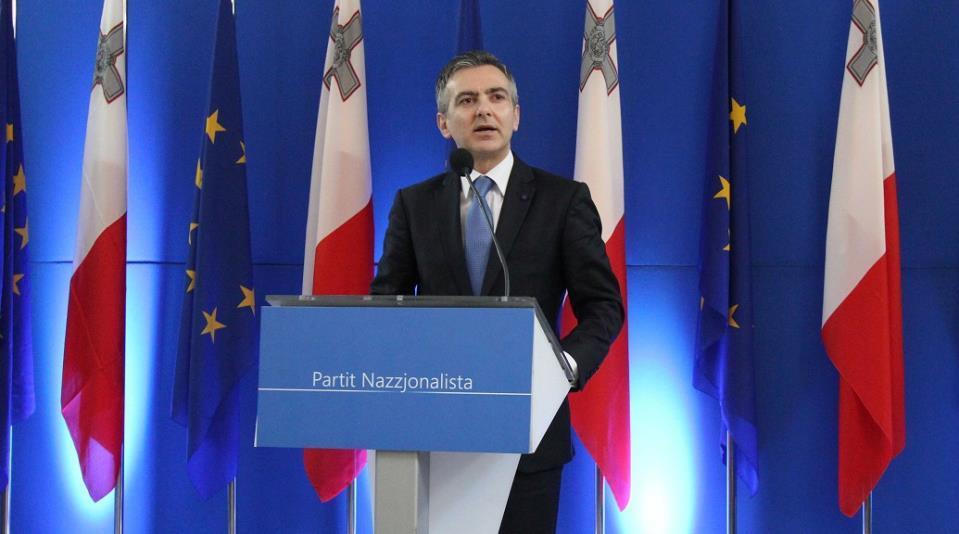When he was elected for the first time in 2006, he was the youngest elected PN councillor. Now he has gone a step further and has accepted to contest the next general election on the fourth district. Ing. Mark Anthony Sammut explains that he will be voting in favour retaining spring hunting in the referendum not for the sake of just doing so, but because he believes that law-abiding hunters should not have their hobby spared and that it only should boil down to harsher controls. But he does insist that the referendum came to be as a result of certain hunters’ abuse and Prime Minister Joseph Muscat’s giving into the hunting lobby’s requests and his flimsy restrictions.

Fuel prices
Ing. Sammut said that Energy Minister Konrad Mizzi’s statement some two weeks ago that fuel prices would be reduced when the hedging agreement expires confirms that the government had put itself in a fix.
On Saturday the government announced that petrol and diesel prices would be reduced today (Monday).
“It is evident that the locked fuel prices agreement went wrong and the government could not do anything about the situation but only wait for it to expire,” he said when asked to comment on Dr Mizzi’s remarks in parliament.
During the controversial energy agreement debate which took place before Saturday’s fuel reduction announcement, Dr Mizzi said that it is not thanks to the Opposition that the fuel prices would be reduced but due to the fact that the hedging agreement is nearing its end.
But Dr Mizzi’s comments came at a time when the Opposition had long been scrutinising the government on the fact that fuel prices in Malta remained among the highest in Europe.
‘Entering politics was never part of my plans’
Ing Sammut will be contesting the next general election on the fourth and fifth district. He currently serves on the Gudja council as a PN councillor.
“Although entering the political scene was not part of my plans, I did so because I felt this was an extension of what I was previously doing – voluntary community work and an active member of the Grupp Żgħażagħ Gudja – politics serving as a tool to convert ideas into action and be of service to others.”
When he was asked to contest the local council elections he was reluctant at first, despite following the scene closely.
“I understood there is a sense of service continuation of what I was doing previously and accepted,” he said.

Sammut spent seven years serving council as sole PN councillor
Out of the nine years Ing Sammut has served the local council, he spent seven serving as the only PN councillor in Gudja.
“During the last local council elections, the Labour Party retained the majority of the Gudja council but the PN managed to gain another seat. It is now three Labour Party representatives to two PN councillors opposed to before when it was four Labour councillors to one PN party councillor,” he explained.
Asked if he feels there is political interference in councils, he replied that as a council “we try not to let partisan politics come in the way in the interest of all residents”.
He believes though that political interference does take place in other councils which have a Labour Party majority and said the Nationalist Party only intervenes when heavy disagreements arise between its own councillors.
"Other than that, the PN has never directed its councillors on what stand to take,” he added.

Convincing switchers
When asked who the driving force of the PN is and if the changes conducted up to now are enough to win back the thousands of people the PN lost, he said that the party “suffered two heavy electoral defeats which forced the PN to make radical changes”.
Simon Busuttil, he said, took the helm of the party when he was needed most, walking out on a higher-paid job and serving the interests of the party.
In his opinion, Dr Busuttil has been very effective and despite the fact that the internal changes carried out so far may not have been visible to the outside world, “the effects of such positive changes will be felt in the years to come”. He also made reference to the party’s policy fora - which aims to bring the party closer to the people - where ideas of the public will be transformed into policies.
Now, he explained, it is time for the party to shift its focus to the political arena, as it has been doing for the past weeks.
“It has been scrutinising the government on various pertinent issues, including the high fuel prices and the energy contract signed between the Maltese government and Shanghai Electric, among others.”
Shadow roles of MEPs
Sceptical at first at the fact that MEPs were given the additional role of shadow ministers, Ing. Sammut said that it is a good idea since MEPs can translate the knowledge they have on topics they are tackling within the European Parliament to the local scene.

PN’s weak point
According to Ing. Sammut, the PN is weak when it comes to communicating its long-term economic vision to the people for instance.
He explained that sometimes the PN speaks of bombastic policies but not everyone understands what the aim behind such policies, or arguments, is.
“For instance, some people feel it is positive for the Maltese government to have managed to convince a Chinese company to inject a sum of money into Enemalta since it would sustain the energy bills.
“This thinking is short-term. The PN is not attacking this fact. What it is saying though, is that the cash injection should be used for infrastructural projects so that the future of our children is secured in terms of jobs. Now, this is what I call long-term thinking.
“Therefore, the PN needs to enhance its way of communicating to the people why it is raising certain pertinent issues in the first place.”

Spring hunting
Ing. Sammut has defended Dr Busuttil’s ‘Yes’ to spring hunting stance but explained that although he is in favour of the season being left untouched, it needs to be more controlled.
“Hunting is an old tradition and personally, I try to look at the issue objectively.
“Numbers show that only a few birds migrate in autumn which makes spring the only season where hunters can actually practice their hobby – global statistics also show that the number of turtle doves and quails hunted here are low as well.
“The negative effects of this practice are not so damaging as to warrant the restriction to law-abiding hunters.
“The derogation should stay and law-abiding hunters should be left to practice their hobby but one needs to take a strong stand against those who abuse.
“Those who hunted illegally in the past will continue to do so – spring hunting or not.
“The PN had introduced preventive measures to curb on hunting-related abuses such as introducing the use of arm bands and time limits but hunters felt annoyed –Prime minister Joseph Muscat on the other hand opened the doors to a free-for-all season by increasing the time limits, apart from Police Administrative Law Enforcement officers having been transferred to other units.
“Therefore, as a result of such changes, which undermined the previous changes introduced by the PN, abuse increased, creating an imbalance to the balance previous PN governments bought about.
“And the fact that such restrictions were not stuck to has led to a referendum which, ironically, was brought about as a result of certain hunters’ actions and the prime minister appeasing the hunting lobby.”
But although environmentalists are disappointed at Dr Busuttil’s decision to vote yes and hunters are naturally glad, Ing. Sammut said the fact remains that Dr Busuttil has remained consistent for what he fought for - the derogation – which he personally had negotiated with the EU.
Doctors, lawyers enjoy political advantage over others
Turning to the issue of doctors and lawyers whose participation is synonymous with politics, he said that people who have taken up a profession like his and enter the political scene have a lot to offer.
“We need to have a better mix of professions in politics – including people with a scientific and engineering background – since we have an attitude of problem solving.
“Lawyers and doctors do enjoy a political advantage over others since both have direct contact with people while we are busy doing our jobs behind the scenes,” Ing. Sammut said.